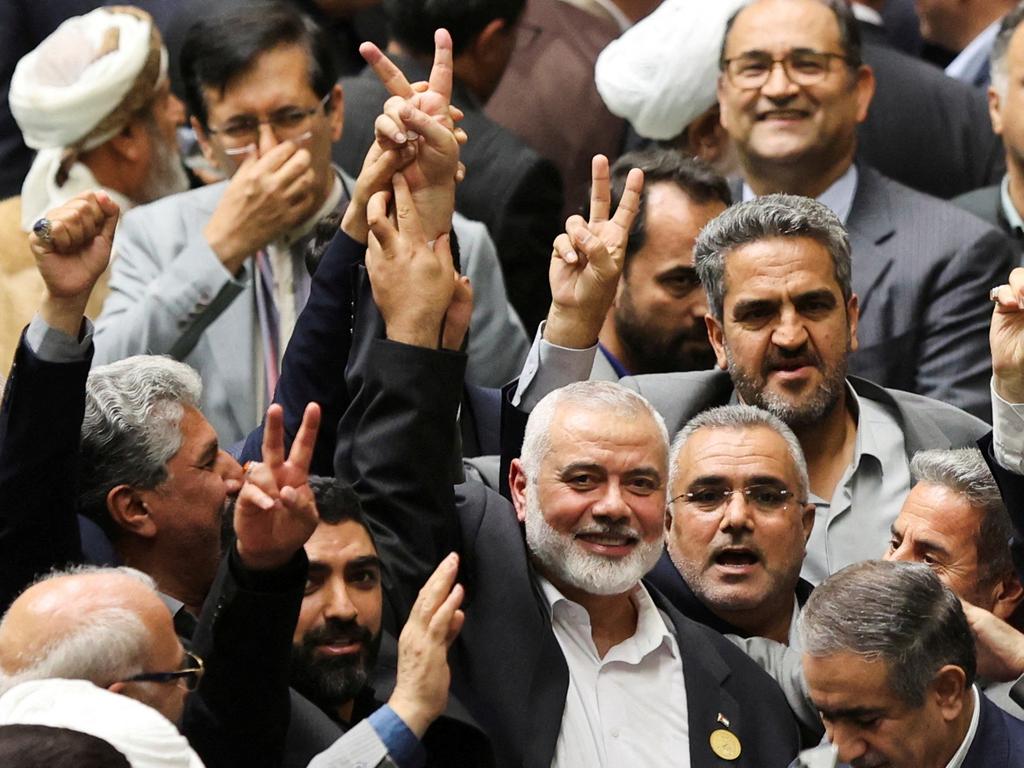Israel brings deterrence back to the war on terror
Hezbollah and Iran may feel constrained to limit their response to the Jewish state’s strikes.

Coming on the heels of strikes that killed Hamas military commander Mohammed Deif in Khan Younis and Hezbollah military commander Fuad Shukr in Beirut, the assassination in Tehran of Hamas’s political leader, Ismail Haniyeh, sent clear messages to Hezbollah, Hamas and, most important, Iran.
Haniyeh was in Tehran for the inauguration of Iran’s new president, who was elected last month following his predecessor’s death in a May helicopter crash.
Iran’s failure to protect a high-level guest at a state event suggests to the world that its security services are deeply penetrated by Israel. This is a devastating demonstration of incompetence for a regime that depends on terror to survive.
In some quarters, Haniyeh is being eulogised as a moderate and Israel’s attack on him condemned as prolonging the war. This is not quite as nonsensical as it sounds. There were hopes in Qatar, Gaza, Turkey and Iran that the US could be bamboozled into supporting a ceasefire leading to a “moderate” Hamas government in a unified West Bank-Gaza Palestinian protostate under Haniyeh’s leadership.
The bamboozling process was well under way. For many on Team Biden, getting a ceasefire and moving toward establishing a Palestinian state had become America’s top objective. Team Harris will likely be even more interested in distancing itself from Israel and reviving the Obama-era policy of seeking détente with Iran.
Haniyeh’s demise could jeopardise, at least for now, Washington’s hopes of a diplomatic breakthrough that delivers a Gaza ceasefire and hostage deal. That comes at a cost. Some in the US government will blame Prime Minister Benjamin Netanyahu for blocking what they see as a promising road to peace.
Team Biden also fears that Iran’s retaliation for the deaths of prominent Hamas and Hezbollah officials might ignite a regional war that could embroil the US. With only months left in office, the Biden administration remains more focused on blocking what it considers “excessive” Israeli responses to Iranian aggression than on stopping Iran’s reckless behaviour across the Middle East.

Blocking a deal that empowers Hamas helps Netanyahu at home. Israelis have been living in a pressure cooker since the October 7 Hamas attacks. The torture, rape and murder of innocent Israelis, the unspeakable suffering of the hostages and their families, and the continuing agony of combat losses reverberate through this tightly knit society in ways that are difficult for outsiders to fully understand.
To most Israelis, ending the war with the installation of a Hamas-led government in the West Bank is unthinkable. It would reward terror and give Israel’s enemies greater power than ever before.
Even so, many Israelis wanted to keep the Haniyeh negotiating channel open in the desperate hope that it might lead to the release of more hostages.
This puts Netanyahu between a rock and a hard place. He had to reject a ceasefire that rewarded Hamas, but he had to seek a ceasefire to free hostages. The killings of Haniyeh, Shukr and Deif help Netanyahu manage both his domestic and his international problems.
In Israel, removing key figures in the Hamas and Hezbollah terror structures is popular. The beleaguered Prime Minister will likely benefit from an uptick in popularity even as the nation prepares for an escalating war.
The moves against Iran, Hezbollah and Hamas will also reassure Israel’s Gulf Arab partners that Israel has the capacity and will to take action in its interest, and to inflict humiliating blows on its foes.
However frustrated the Americans are with the attacks, Washington can hardly condemn Israel for eliminating three of the top targets on America’s list of global terrorists.

And with Vice-President Kamala Harris’s national security adviser under fire for ties to figures accused of co-operating with Iranian influence operations in the US, the administration won’t want to advertise a breach with Israel in the run-up to the November election.
But Netanyahu would be poorly advised to rest on his laurels. Israel could face a much more hostile America if Harris succeeds Joe Biden. Iran is on the brink of a nuclear breakout, and Israeli society remains deeply polarised. Most Israelis want the Prime Minister to step down, but there is no consensus on who should replace him.
As Iran and Hezbollah mull their options for retaliation, as Team Biden ponders its response to Israel’s refusal to follow Washington’s lead, and as Israeli politicians adjust to the new political situation, the risks of an expanding Middle East war are real. But the strikes in Beirut and Tehran have likely had a healthy deterrent effect.
We can hope that, as has happened so often in the past, Hezbollah and Iran will limit their responses to Israel’s attacks out of respect for Israel’s power.
The Wall Street Journal





To join the conversation, please log in. Don't have an account? Register
Join the conversation, you are commenting as Logout